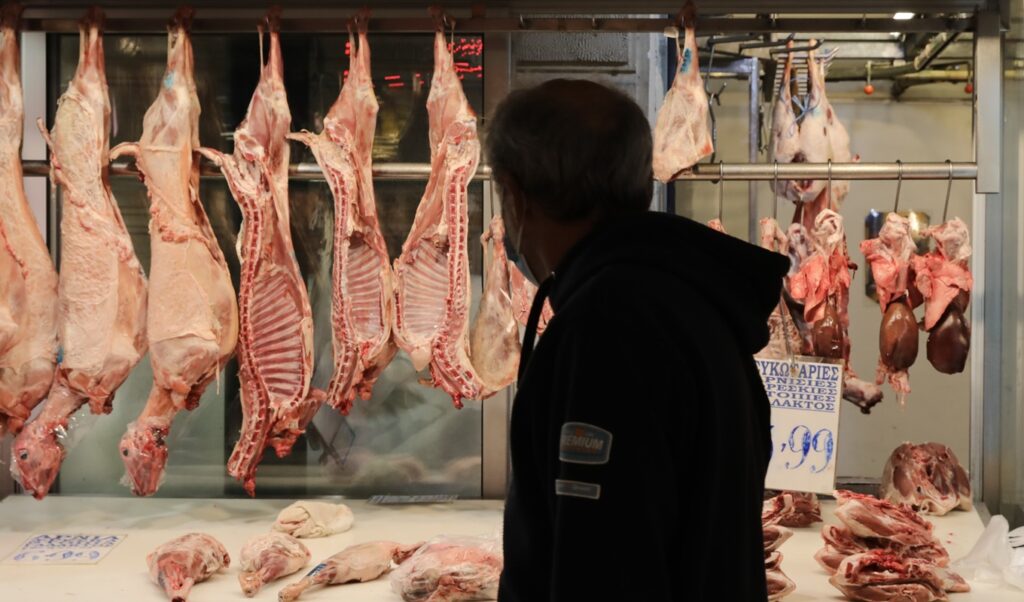Veal meat will sell for one to two euros more per kilogram in the coming weeks, while corresponding price increases will occur in dairy products due to foot-and-mouth disease. As revealed by the “Sunday Afternoon” report at “Varvakeios”, neighborhood butcher shops and supermarkets, the price of veal will range between 17 and 20 euros and lamb at 16-17 euros, from the current 13.80 to 14.50 euros.
Read: Sheep and goat foot-and-mouth disease: What scientists, government and producer representatives fear and declare to Parapolitika
New wave of high prices due to foot-and-mouth disease: price increases in meat, milk and feta
So far, more than 260,000 sheep and goats have been lost, while producer prices have already risen, with sheep meat selling from 4.5 to 4.8 euros per kilogram, from 3.5-3.8 euros in the previous period. Lamb is leaving farmers at 9.5 euros per kilogram, from 7.5 euros before the disease outbreak. With sheep and goat milk already selling from producers at 1.4 to 1.6 euros per kilogram, market sources warn of the risk of price increases in dairy products and especially feta.
Concerns and continuous inspections
“There will definitely be price increases if this exponential development of disease spread continues. The product that will be significantly affected is feta. The priority given by feta producers is to cover the agreements that exist with major foreign markets. Therefore, a smaller percentage will remain in Greece for distribution with the same demand” states Christos Apostolopoulos, president of the Association of Greek Dairy Product Industries.
On the third day of implementing the ten-day plan, carried out by the Ministry of Rural Development in cooperation with the regions, special stations have been set up on the country’s road networks for disinfecting vehicles entering livestock farms, in order to stop the spread of the disease. To avoid a livestock lockdown, veterinarians are conducting continuous inspections at livestock units, while farmers are called to strictly observe biosafety measures.
What happens with imports
However, while the European Union imposes strict rules on domestic livestock farming and agricultural production, there is no real control over imports from third countries, while especially in agricultural products there is rarely origin labeling, with consumers choosing the cheaper option over one produced with minimal pesticide use, specific green practices and consequently higher cost, thus more expensive. Already, through the Mercosur agreement signed mid-week, increased imports of beef from South American countries are planned.
For their part, livestock farmers demand immediate measures to protect livestock, as well as compensation payments to affected farmers. It’s worth noting that the demands include stopping the slaughter of farmers’ livestock for animals not infected with foot-and-mouth disease, immediate vaccination of sheep and goats without delay, immediate reopening of slaughterhouses that remain closed, and immediate payment of compensation to those affected.
Finally, it should be noted that health authorities assure there is no risk to public health. Milk remains absolutely safe for consumption, provided it has undergone high pasteurization, as heat treatment neutralizes any potential risk. Similarly, sheep and goat meat can be consumed normally, without any restrictions.
Biosafety versus lockdown and vaccination disagreement
As sheep foot-and-mouth disease has taken explosive proportions, bringing despair to livestock farmers and the dairy industry, which sees iconic Greek products like feta threatened, the Ministry of Rural Development and Food puts the country in a state of operational readiness, aiming for immediate containment of the zoonotic disease.
According to the plan, MARD veterinarians are now daily in the field in cooperation with DAOK (Directorates of Rural Economy and Veterinary Medicine), conducting intensive inspections and informing farmers about observing biosafety measures. Simultaneously, disinfection stations are being created on central road arteries and basic passages for moving animals, feed and milk, to ensure complete control of spread.
Minister K. Tsiaras spoke of a “ten-day assault,” emphasizing that foot-and-mouth disease is a difficult zoonotic disease requiring coordinated action and strict discipline. “If we don’t strengthen biosafety measures now, we’ll face lockdown,” he warned, asking for cooperation from regions and all involved bodies. So far, 260,000 animals have been slaughtered, of which 100,000 in Thessaly, while approximately 60,000 have been slaughtered in the last 40 days.
Livestock farmers are in turmoil and on Thursday, September 18, a pan-Thessalian rally-blockade took place on E65 in Karditsa, with participation from farmers and beekeepers. Among other things, they demand the ministry conduct vaccination, though there are conflicting views. The ministry’s position is that exports of a PDO product, feta, are questioned, as some countries have informed that if vaccination occurs, they won’t procure feta from our country.
They also demand immediate compensation payments. As their representatives characteristically say, “when you destroy a business’s livestock and leave them without income, this income must be compensated so this farmer can continue their activity.”
Published in Sunday Afternoon




